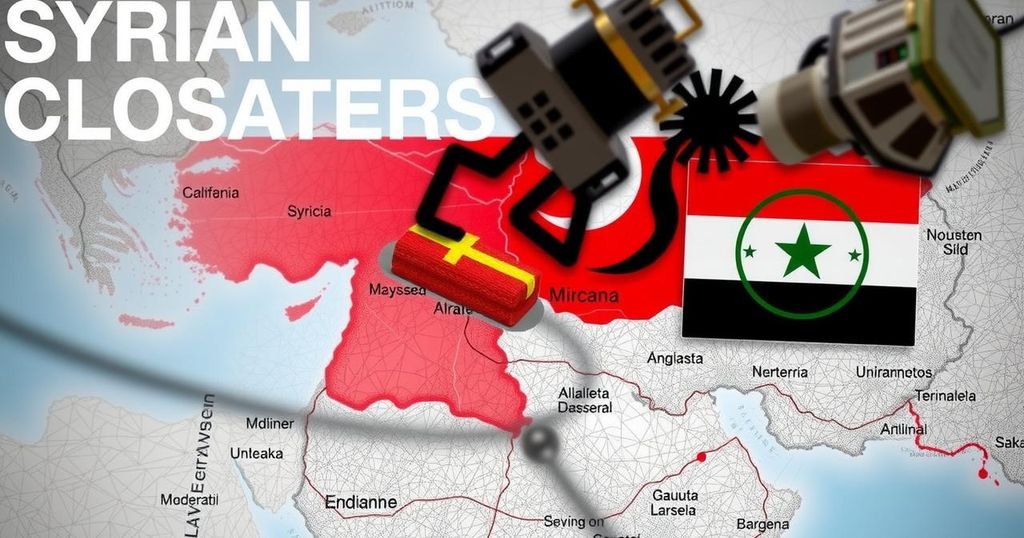World news
AL - ASSAD, AL QAEDA, ASIA, BASHA, BASHAR AL - ASSAD, CEASEFIRE, CIVILIAN CASUALTIES, CONFLICT, DAMASCUS, DEIR AL - ZOUR, GAZA, GAZA STRIP, GOLAN HEIGHTS, HAYAT TAHRIR AL - SHAM, HOMS, ISRAEL, JERUSALEM, JORDAN, LEBANON, MIDDLE EAST, MILITARY OPERATIONS, NORTH AMERICA, PHILIPPINES, RAJA ABDULRAHIM, RAJA ABDULRAHIM THOMAS FULLER, SYRIA, THE TIMES, UNITED NATIONS, UNITED STATES, WAR
Aisha Khan
0 Comments
Syrian Rebel Gains Prompt Regional Border Closures Amid Rising Tensions
The recent advances made by Syrian rebels, particularly Hayat Tahrir al-Sham, have led to heightened security concerns in neighboring Lebanon and Jordan, prompting border closures and increased military presence by Israel. Significant territorial gains towards Homs and Damascus pose a serious challenge to Assad’s regime amidst a backdrop of stalled diplomatic resolutions and intensified conflicts.
The swift advances of Syrian rebel factions, primarily spearheaded by Hayat Tahrir al-Sham, have raised significant concerns among neighboring nations, prompting Lebanon and Jordan to tighten border crossings, and compelling Israel to bolster its military presence in the Golan Heights. Reports indicate that these rebels have escalated their efforts towards the pivotal city of Homs, drawing closer to the capital, Damascus. This momentum in warfare signals a critical erosion of President Bashar al-Assad’s authority, intensifying fears of unrest spilling across Syria’s borders.
The ongoing conflict, which has been overshadowed by concurrent crises in Gaza and Lebanon, persists in a state of protracted stalemate, with diplomatic endeavors failing to yield any substantial progress toward resolution. A notable development is the deployment of a Kurdish-led force, supported by the United States, into Deir al-Zour, a city previously under government control. This situation underscores the burgeoning challenge posed to al-Assad’s regime by rebel advancements in the context of a volatile landscape.
Despite having distanced itself from Al Qaeda, Hayat Tahrir al-Sham remains classified as a terrorist organization by both the United States and the United Nations, illustrating the complexities surrounding the coalition of rebels battling the Assad government. Such rapid territorial gains emphasize the pressing instability within Syria and the potential ramifications for neighboring countries as the conflict continues to evolve.
The Syrian civil war, ongoing since 2011, has drawn in myriad factions with differing allegiances and ideologies. The stalemate in diplomatic discussions has resulted in continued conflict, with various groups vying for control. The recent gains by rebel forces, notably those aligned with Hayat Tahrir al-Sham, pose a serious challenge to the Assad administration, which has struggled to maintain stability following years of unrest. This turmoil has led to heightened tensions in the region, impacting border security and international relations.
In conclusion, the advancing rebel forces in Syria signify a critical turning point in the ongoing civil conflict, as regional neighbors respond with increased security measures. The actions of Lebanon and Jordan in closing border crossings highlight the potential for expanded chaos as the Assad government loses control. Furthermore, the involvement of separate forces, such as the Kurdish-led faction, complicates the situation, marking it as one of the most challenging periods for al-Assad’s regime in recent years.
Original Source: www.nytimes.com




Post Comment